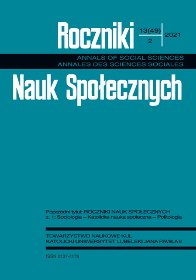Polityka Francji i Niemiec wobec niepodległej Ukrainy. Wokół stabilizacji i bezpieczeństwa
Abstrakt
Artykuł analizuje kształtowanie się polityki głównych państw UE wobec niepodległej Ukrainy. Wskazano, że na ów proces wpłynęło kilka czynników, m.in. historia stosunków między poszczególnymi państwami a Imperium Rosyjskim i ZSRR, brak doświadczenia we współpracy z Ukrainą jako niezależnym państwem, interesy geopolityczne. W niemieckich i francuskich kręgach politycznych oraz w mediach wyrażono zaniepokojenie możliwością proliferacji broni jądrowej przez Ukrainę, co z kolei doprowadziło do politycznej i ekonomicznej presji na stanowisko Ukrainy w sprawie jej statusu nuklearnego. Artykul potwierdza, że kwestia technologii jądrowych nie ograniczała się do dyskusji o dawnym istnieniu arsenału jądrowego na Ukrainie. Francja i Niemcy biorą czynny udział w działaniach w strefie Czarnobyla. Czołowe państwa UE w latach 90. XX wieku wyraziły nadzieję na demokratyczne przemiany w Rosji, przejrzystość i rozwój społeczeństwa obywatelskiego. Ukraińska polityka wielowektorowa była niezrozumiała dla państw zachodnich. Podobnie jak próżnia bezpieczeństwa odczuwana przez Ukrainę, która została stopniowo uwięziona w geopolitycznym uścisku dwóch bloków obronnych: NATO na Zachodzie i Układu o Bezpieczeństwie Zbiorowym Taszkentu na Wschodzie. Od 2014 r. Francja i Niemcy w formacie normandzkim są mediatorami w rozstrzyganiu konfliktu rosyjsko-ukraińskiego na Donbasie, ale na razie nie ma postępów w rozwiązaniu tego konfliktu o niskiej intensywności.
Bibliografia
Автономія сепаратистам та демілітаризована зона – це план Франції [Avtonomiya separatystamta demilitaryzovana zona – tse plan Frantsiyi] (2015), Ukrainian Voanews, 07.02, http://ukrainian.voanews.com/content/article/2633058.html [dostęp: 05.05.2021].
Берлін дасть Україні ще 19 млн євро на ліквідацію наслідків Чорнобильської катастрофи [Berlin dast’ Ukrayini shche 19 mln yevro na likvidatsiyu naslidkiv Chornobyl’s’koyi katastrofy] (2016), 22.04.2016, https://www.5.ua/amp/suspilstvo/berlin-dast-ukraini-shche-19-mln-ievro-na-likvidatsiiu-naslidkiv-chornobylskoi-katastrofy-112255.html [dostęp: 15.02.2021].
Czytaylo O. (2013), Ольга Самборська: «В Німеччині жити легше, коли відмовишся від своєї ментальності» [Ol’ha Sambors’ka: «V Nimechchynizhyty lehshe, koly vidmovyshsya vid svoyeyi mental’nosti»], Високий Замок [Vysokyy Zamok] 29.01.2013, https://wz.lviv.ua/article/121951-olha-samborska-v-nimechchyni-zhyty-lehshe-koly-vidmovyshsia-vid-svoiei-mentalnosti [dostęp: 03.03.2020].
Drzewicki A. (2019), Problem NATO w relacjach niemiecko-ukraińskich w XXI wieku. Zarys zagadnienia, Roczniki Nauk Społecznych, nr 11(47), s. 53-78.
Entretien du ministre des Affaires étrangères, M. Hubert Védrine, avec “France-Inter” (1999), La politique étrangère de la France. Textes et documents, Novembre-décembre, s. 4-7.
Erler G. (2017), Для Німеччини беззаперечним є той факт, що без виконання всіх пунктів Мінська не може бути повного припинення санкцій [Dlya Nimechchyny bezzaperechnym ye toy fakt, shcho bez vykonannya vsikh punktiv Mins’ka ne mozhe buty povnoho prypynennya sanktsiy], Український Тиждень [Ukrayins’kyy Tyzhden’], nr 3(515), s. 14-15.
Gasztold A. (2018), Koncepcja bezpieczeństwa Niemiec, [w:] R. Zięba (red.), Bezpieczeństwo międzynarodowe w XXI wieku, Warszawa: Wydawnictwo Poltext, s. 157-171.
Kosmel’ M. (2017), Кремль працює з усіма силами, які йдуть на контакт, для дестабілізації західних демократій [Kreml’ pratsyuye z usima sylamy, yaki ydut’ na kontakt,dlya destabilizatsiyi zakhidnykh demokratiy], Український Тиждень [Ukrayins’kyy Tyzhden’], nr 36(512), s. 37-38.
Kryvonos R. A. (2008), Українсько-німецькі відносини [Ukrayins’ko-nimets’ki vidnosyny], [w:] Україна в постбіполярній системі міжнародних відносин, ред. Л.В. Губерський, Київ: Київський Університет [Ukrayina v postbipolyarniysystemi mizhnarodnykh vidnosyn, red. L.V. Hubers’kyy, Kyyiv: Kyyivsʹkyy Universytet], s. 264-282.
Lazareva A. (2018), Навшпиньки понад прірвою [Navshpyn’ky ponad prirvoyu], Український Тиждень [Ukrayins’kyy Tyzhden’], nr 9, s. 31-32.
Léotard F. (1994), La France et le “nouveau monde”, Politique internationale (hiver), nr 62, s. 9-23.
Macegora E. (2018), Зона отчуждения – «чернобыльская мекка» или перспективный инвестпроект для международных компаний [Zona otchuzhdeniya – «chernobyl’skaya mekka» ili perspektivnyy investproyekt dlya mezhdunarodnykh kompaniy], Realist, https://re alist.online/article/zona-otchuzhdeniya-chernobylskaya-mekka-ili-perspektivnyj-investproekt-dlya-mezhdunarodnyh-kompanij [dostęp: 03.05.2021].
Меркель назвала війну в Україні найскладнішим для неї питанням [Merkel’ nazvala viynu v Ukrayini nayskladnishym dlya neyi pytannyam] (2017), 19.09.2017, LB.ua, https://lb.ua/world/2017/09/19/376939_merkel_nazvala_voynu_ukraine_samim.html [dostęp: 04.01.2021].
Меркель підтримала захист України за допомогою жорстких санкцій проти Росії [Merkel’ pidtrymala zakhyst Ukrayiny za dopomohoyu zhorstkykhsanktsiy proty Rosiyi] (2018), 27.04.2018, Ukrainian Voanews, https://ukrainian.voanews.com/a/merkel-ukraina/4368021.html [dostęp: 17.04.2021].
Mitrofanova O. (2009), Les péripéties du dialogue franco-ukrainien, 15.05.2009, Centre Thucydide, https://www.afri-ct.org/2009/les-peripeties-du-dialogue-franco2089/ [dostęp: 07.05.2021].
Mitrofanova O. (2021), Складнощі розуміння: як бачать Україну французькі дипломати [Skladnoshchi rozuminnya: yak bachat’ Ukrayinu frantsuz’ki dyplomaty] 15.02.2021, Європейська правда [Evropeys’ka pravda], https://www.eurointegration.com.ua/articles/2021/02/15/7119752/ [dostęp: 12.05.2021].
Nord Stream 2: Меркель нагадала, що Європа все одно купує газ у Росії [Merkel’ nahadala, shcho Yevropa vse odno kupuye haz u Rosiyi] (2021), 04.2021, Ukrinform, https://www.ukrinform.ua/rubric-world/3231301-nord-stream-2-merkel-nagadala-so-evropa-vse-odno-kupue-gaz-u-rosii.html [dostęp: 30.04.2021].
Situation en Ukraine : la position de la France (2020), Ministère de l’Europe et des Affaires étrangères, 06.2020, https://www.diplomatie.gouv.fr/fr/dossiers-pays/ukraine/situation-en-ukraine-la-position-de-la-france/ [dostęp: 04.05.2021].
Soulé V. (2001), Ukraine, l’instable équilibre entre Est et Ouest, Libération, 20.06, https://www.liberation.fr/tribune/2001/06/20/ukraine-l-instable-equilibre-entre-est-et-ouest_368589/ [dostęp: 06.05.2021].
Tertrais B. (2014), France and the Ukraine crisis: A delicate balancing act, European Leadership Network, 10.03, https://www.europeanleadershipnetwork.org/commentary/france-and-the-ukraine-crisis-a-delicate-balancing-act/ [dostęp: 11.05.2021].
Tinguy De, A. (2006), Le triangle Kiev-Bruxelles-Moscou : l’impact de la « révolution orange » et de la présidence Iouchtchenko (janvier-2005-aout 2006), Revue d’études comparatives Est-Ouest, nr 37, s. 81-118.
Yakushkin D. (1991), Ельцин во Франции: просчеты с двух сторон [El’tsyn vo Frantsyy: proschetы s dvukh storon], Московские Новости, 28.04.
Zholkver M., Sokolovska N. (2014), Українська криза і німецький “комплекс провиниˮ [Ukrayins’kakryza i nimets’kyy “kompleks provynyˮ], DW, 12.12, https://www.dw.com/uk/українська-криза-і-німецький-комплекс-провини/a-18125946 [dostęp: 1.05.2021].
Copyright (c) 2021 Roczniki Nauk Społecznych

Utwór dostępny jest na licencji Creative Commons Uznanie autorstwa – Użycie niekomercyjne – Bez utworów zależnych 4.0 Międzynarodowe.


